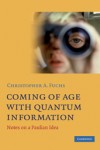 Every Friday during the month of March, This Side of the Pond will feature correspondence drawn from Coming of Age With Quantum Information: Notes on a Paulian Idea, a collection of more than 500 letters between physics luminary Christopher A. Fuchs and his friends, mentors, and other pioneers in the field. In our first edition, Fuchs writes to his oldest and dearest friend about Billie Holiday, Einstein’s idea of entanglement, and Ethiopian food.
Every Friday during the month of March, This Side of the Pond will feature correspondence drawn from Coming of Age With Quantum Information: Notes on a Paulian Idea, a collection of more than 500 letters between physics luminary Christopher A. Fuchs and his friends, mentors, and other pioneers in the field. In our first edition, Fuchs writes to his oldest and dearest friend about Billie Holiday, Einstein’s idea of entanglement, and Ethiopian food.
03 August 1996, “Lonely Jazz”
Ms. Holiday is playing in the background and I’ve got my first cup of the morning. I’m still pretty much exhausted. I ended up staying at IBM an extra day, and the whole affair was pretty intense from start to finish. I think we found something very, very nice . . . which, of course, was expected – that’s why we got together in the first place. The idea is simple and it’s this. Suppose Alice needs to communicate to Bob one bit of information, either a 0 or a 1. Also let us suppose the resources available to her for carrying out this task are two (noisy) fiber optic cables and two photons, one for each cable. The bit will, in some sense, be carried in the polarization of the photons; we allow two photons in the game to give Alice a little redundancy to help her get past the noise. Note that I’ve said nothing about how the photons are produced; I didn’t say anything about whether they came from a single source (localized in some small region of space) or whether they are generated by two coordinated but independent sources. Now the question is this: can the transmission’s fidelity be helped by allowing the photons to be generated at a single source AND combining them back together before Bob performs his measurement (for gathering the bit)? That is to say, can we increase Bob’s chances of guessing the bit correctly by first generating the photon at a single source – so the two are “entangled” in a strange quantum mechanical way – and then allowing Bob to make a measurement on the two together, a measurement on the whole being greater than a sum of its parts? The answer is yes, and I find that so wonderful.
Why, you ask? Because, it’s wonderful . . . period. And a bit unexpected too actually. I guess the thing I really like the most about so many of the questions we’ve been asking lately is that they really put “entanglement” to use. I just ran across a wonderful quote by Oppenheimer the other day, from a letter he wrote to Fowler soon after Hahn and Strassmann discovered uranium fission:
The U business is unbelievable. . . . What do you think? It is I think exciting, not in the rare way of
positrons and mesotrons, but in a good honest practical way.
The idea of entanglement has its origin in Einstein, perhaps as early as 1930 . . . though I can’t recall for sure right now. In any case, a pretty clear statement of it and what he didn’t like about it came out in 1935 in the paper of Einstein, Podolsky, and Rosen. (It’s through Nathan Rosen that I have my “Einstein Number” 3: Rosen having written many papers with Einstein, Peres having written many papers with Rosen, and I having written a paper with Peres.) Its existence was something EPR considered clear-cut evidence that quantum theory could not be a “complete theory.” (I.e., by this time Einstein had already given up the idea that the theory was wrong, he just didn’t think that it could be the whole story.) Since then, the notion just pretty much stayed an oddity, only thought about for the most part by the philosophically minded . . . that is, until its practical resurrection in quantum information theory.
By the way, I should point out that EPR were wrong in the sense that it was finally shown in 1964 that quantum theory could not be “completed” in their sense. Any such completion (that took entanglement away) would contradict experiment – and very fine experiments on this phenomenon have been done. What we have now is that, not only is entanglement required for consistency with observation, but also that it can be exploited for something interesting (and perhaps practical).
Enough physics, right? Ms. Simone is on by now, I should say. Kiki and I are about to step out for Ethiopian. It’s a place with a lunchtime buffet; we haven’t tried it before. I had Ethiopian in DC once and was really taken with it, but I haven’t been able to recapture the experience since then. Perhaps the fourth time’s a charm. Then we’re gonna do a little CD shopping.
Here I’d thought that I was gonna answer all your questions about Canadian beer and such this morning, but instead I just got carried away with science. Sorry about that. I’ll be back later in the day with something more on the mundane (not the derogatory meaning of the word, but rather “earthly as opposed to heavenly”).
Latest Comments
Have your say!